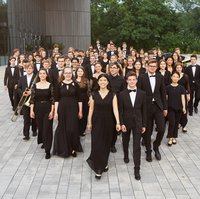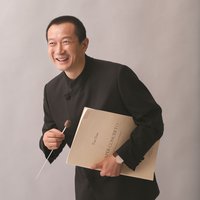To mark the 200th anniversary of Beethoven’s Ninth Symphony, Tan Dun composed »Choral Concerto: Nine« – a tribute to Beethoven’s epochal symphony. We asked the Chinese composer and conductor about the new work.
5 Questions for ...
Composer Tan Dun

1. How did you decide on the lyrics for your new piece »Choral Concerto: Nine«?
I have sought out different poets from different worlds and different points in history to form my libretto. Firstly, I used the poetry of Qu Yuan, perhaps some of the earliest ritual opera from 2.400 years ago, where the music has been lost but the words remain. In my imaginings, I try to replace the music to this ancient poetry, bringing back what has vanished.
Another poet I turned to is Li Bai, from 1.300 years ago. He writes so beautifully about nature – describing the company of the moon amongst the shadows. Human beings and nature have a deep connection and I have always been fascinated by it. I also use some words from Friedrich Schiller and quote Beethoven’s renowned »Ode to Joy« – to the creatures of nature, creatures of love and creatures of our own mind.
2. What are the links or similarities between »Choral Concerto: Nine« and Beethoven’s 9th Symphony?
When I listen to Schiller’s words at the very beginning of »Ode to Joy«, he proclaims that all people are brothers and all creatures are together in this one world. Chinese philosophers Lao Zi and Zhuang Zi, from 2.500 years ago, also said that very same thing and felt the same way. Thus, there is a deep connection between these two worlds.
3. What sound do you expect from the choir, especially when they are not singing in English?
Actually, a lot of what the chorus sings and chants are empty words. Some from Taoist and Buddhist traditions and some simply nonsense words. ›Empty‹ means everything. Nothing exists in an enduring manner. Thus, I find it very interesting to use the ›emptiness‹ to represent ›everything‹. In silence, I fill the shapeless space and compliment the greatest sound. That is why I thought that using empty words might be an interesting parallel to Beethoven. Maybe that is the only way, because Beethoven is so giant, so big.
4. The three movements of your piece are titled »Nine«, »Wine« and »Time« – to what do these titles relate?
These three words in Chinese are »Jiu«, »Jiu«, »Jiu«. All three are pronounced the same. These three words are connected in such an interesting way … my piece tries connecting the sounds of nature, of spirit and time to create everlasting peace.
5. Are there any instruments in the scoring that are not part of the conventional Western orchestra?
I wanted to use the exact same instrumentation that Beethoven used 200 years ago. I wanted to test myself: if I use the same instrumentation as Beethoven, what can I do and what can I say? I find it very interesting: Beethoven used the same instrumentation as Mozart and Monteverdi, and I use the same as Stravinsky or Debussy, but what do we create? We might share instrumentation, but we create a different world, because we come from different traditions, we speak different languages and have different histories. But, beneath all of it, we are the same, we come from the same structure. To use the same instrumentation as Beethoven used 200 years ago is much more meaningful, spiritually, for me.
Performances of Tan Dun’s »Choral Concerto: Nine« at the festival 2024
- , Kaiser-Wilhelm-Gedächtniskirche Berlin
Special concert Berlin: Beethoven 9
Bundesjugendorchester, World Youth Choir, Jörn Hinnerk Andresen
Dun, Beethoven

